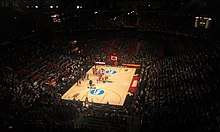Sport in Madrid
Madrid is home to a number of football teams and other sports teams.
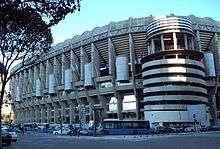
History
.jpg)
The settling in Madrid of the Basque industrial and trading bourgeoise in the late 19th-century and the subsequent opening of several frontones led to the city becoming the world capital of pelota for a brief spell,[1] before being displaced among the preferred mass sports by association football.
Football
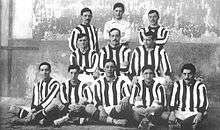
Madrid is home to La Liga football club giants Real Madrid, who play their home games at the Santiago Bernabéu. Their supporters are referred to as Madridistas or Merengues (Meringues). Real Madrid is one of the most prestigious football clubs of the world (FIFA selected Real Madrid the best team of the 20th century), having won a record 13 European Cups. Real has also won record 33 league titles and 19 Copa del Rey titles.
.png)
Real Madrid's successful hometown rivals, Atlético Madrid, are also well supported in the city. The club has recently won three UEFA Europa League titles and the 2012–13 Copa del Rey, beating their crosstown rivals 2–1 at the Santiago Bernabéu in the final, and a new league title in 2014. Historically, Atlético has won ten league titles and ten Copa del Rey titles. The players (and supporters) are referred to as Colchoneros (The Mattressers), in reference to the team's red and white jersey colours, which were determined by mattress material being the cheapest at the time of the club's formation. Atlético play at the Metropolitano Stadium.
In 1982, Madrid hosted the FIFA World Cup Final. Along with Barcelona, Glasgow and Lisbon, Madrid is one of only four cities in Europe to contain two UEFA 5-star stadia: Real Madrid's Santiago Bernabéu and Atlético Madrid's Vicente Calderón both meet the said criteria. Rayo Vallecano is the third team from the municipality currently playing in La Liga.
Some of Spain's top footballers are Madrilenians (born in Madrid), including Real Madrid former player Emilio Butragueño (and co-teammate of La Quinta del Buitre, "The Vulture's Cohort"), Pepe Reina, Fernando Torres and Real Madrid veterans Raúl, Guti and Iker Casillas.
Basketball
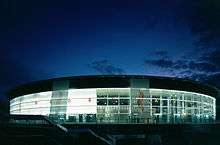
Madrid boasts a prominent place in Spanish basketball, with two clubs in the country's top-level Liga ACB. Real Madrid's basketball section has won 30 Spanish League championships, 22 Spanish Cup championships, 8 Euroleague Championships, 4 Saporta Cups, 4 Intercontinental Cups and have won 2 Triple Crowns. Madrid's other professional basketball club is Estudiantes that have won 3 Spanish Cup championships.
Tennis
Madrid hosts the Mutua Madrileña Madrid Open. The tournament is classified as an ATP World Tour Masters 1000 event on the Association of Tennis Professionals tour, and a Premier Mandatory event on the Women's Tennis Association tour. Caja Mágica (The Magic Box, and also known as the Manzanares Park Tennis Centre) is a tennis structure located at Manzanares Park, used for the Madrid Masters tournament, Caja Mágica is also home to the Spanish F1 team HRT F1 Team.
Bullfighting
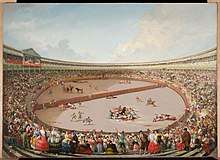
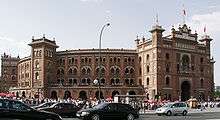
The first big bullring in the city, built in 1749 during the reign of Ferdinand VI, was located next to the puerta de Alcalá.[2] It lasted until the 1870s, and it was replaced in 1874 by the bullring of Goya, located in the plot currently occupied by the Palacio de los Deportes.[2]
Madrid currently hosts the largest plaza de toros (bullring) in Spain, Las Ventas, established in 1929. Las Ventas is considered by many to be the world centre of bullfighting and has a seating capacity of almost 25,000. Madrid's bullfighting season begins in March and ends in October. Bullfights are held every day during the festivities of San Isidro (Madrid's patron saint) from mid May to early June, and every Sunday, and public holiday, the rest of the season. The style of the plaza is Neo-Mudéjar. Las Ventas also hosts music concerts and other events outside of the bullfighting season.
Cycling
Historically, the city serves as the final stage of the Vuelta a España cycling event, in the same way Paris serves as the conclusive stage of the Tour de France.
Events hosted
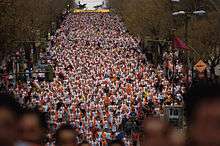
In the past, Madrid has bid to host the 1972, 2012, and 2016 and 2020 Summer Olympics, which were awarded to Munich, London, Rio de Janeiro and Tokyo respectively.[3] The city has two major annual road running events – the Madrid Marathon and the San Silvestre Vallecana 10 km (6 mi) run – tens of thousands of runners take part in these races each year.[4] As reported by Olympic news outlet Around the Rings,[5]
Spain hosted the 1982 FIFA World Cup and the final was held in Madrid. It has also hosted the final of European Champions League (1957, 1969, 1980, 2010); the final of Europa League (1985, 1986); final of the FIBA EuroBasket (several times); 1974 EuroHockey Nations Championship; European Judo Championships (1965, 1973, 1981); 2005 UCI Road World Championships; European Karate Championships (1983, 1986); 2005 World Taekwondo Championships; 2002 World Cup in Athletics; Intercontinental Cup (1960, 1966, 1974); 2004 European Aquatics Championships; 1964 European Nations' Cup; 2003 FIVB Volleyball World League; European Athletics Indoor Championships (1968, 1986, 2005); UCI Mountain Bike World Cup (every year); WTA Tour Championships (2006, 2007); Spanish International Badminton Tournament (every year); 1986 World Aquatics Championships and several other. Spain hosted the 1986 FIBA World Championship and the 2014 FIBA Basketball World Cup, with the final match held at the Palacio de Deportes de la Comunidad de Madrid in Madrid.
Olympics Bids
The history of Madrid's bid to host the Olympic Games dates back to December 29, 1965 when the Spanish government presented a joint bid Madrid-Barcelona to the International Olympic Committee (IOC) to host the 20th edition of the Games in 1972. The Spanish candidature was however ruled out in the IOC session held in Rome on 26 April 1966, where Munich was finally elected.
Many years later, Madrid's council presented a bid to host the 2012 Summer Olympics. The candidate city logo was designed by Javier Mariscal, a Spanish artist who also designed the mascot for the Barcelona 1992 Olympic Games.[6] On May 18, 2004 the IOC selected in Lausanne (Switzerland) the five official candidate cities for the organization of the Olympic Games of 2012: Madrid, Paris, London, New York and Moscow. On July 6, 2005, the IOC announced the result of the election of the city that would host the 2012 Olympics: the choice was London, and the city of Madrid finished third. Later, an IOC member told reporters he made a mistake when marking his vote, so Madrid was eliminated in the penultimate voting.[7] During the selection process for the 2012 Summer Olympics, there was among Madrid citizens a minority social movement of opposition to the nomination, which was accused of favoring real estate speculation and increase the already high indebtedness of the council.
The Spanish Olympic Committee renewed on May 30, 2007 the Madrid bid for the 2016 Summer Olympics. On June 4, 2008 Madrid was shortlisted as one of the candidates to host 2016 Games, along with Chicago, Tokyo and Rio de Janeiro. The project presented was based on the prior application with improvements, which allowed him to be the second city with the highest rating, slightly behind Tokyo. Finally, on October 2, 2009 the city of Rio de Janeiro won the election, despite having initially a general technical assessment below that of the other three cities.
Madrid resubmitted an application to host the games in 2020. The IOC selected Madrid as candidate city on May 23, 2012.[8] On September 7, 2013 the candidate cities were Madrid, Istanbul and Tokyo. On the first ballot Madrid and Istanbul yielded the same votes after Tokyo. In the runoff vote, Madrid was eliminated[9] and in the final vote, Tokyo won by a large number of votes.
Following Madrid's failure to secure the 2020 Olympics, it was confirmed that Madrid would not be bidding for the 2024 Summer Olympics.[10]
Teams
| Club | League | Sport | Venue | Established | Capacity |
|---|---|---|---|---|---|
| Real Madrid C.F. | La Liga | Football | Santiago Bernabéu | 1902 | 85,454 |
| Atlético Madrid | La Liga | Football | Wanda Metropolitano | 1903 | 67,703 |
| Rayo Vallecano | La Liga | Football | Estadio de Vallecas | 1924 | 15,500 |
| Real Madrid Castilla | La Liga | Football | Alfredo di Stéfano | 1930 | 6,000 |
| Real Madrid Baloncesto | ACB | Basketball | Palacio de Deportes de Madrid | 1931 | 16,000 |
| CB Estudiantes | ACB | Basketball | Palacio de Deportes de Madrid | 1948 | 16,000 |
See also
References
- Fraguas, Rafael (12 April 2013). "Del juego de pelota". El País.
- López Trujillo, Noemí (10 June 2012). "Las desconocidas plazas de toros de Madrid". ABC.
- "Madrid Bids for 2020 Olympic Games". CNN. 13 July 2011. Retrieved 15 September 2011.
- Valiente, Emeterio (25 April 2010). Course record for Cherogony, while Gebrselassie 'jogs' to 10 km (6.21 mi) victory – Madrid Marathon report. IAAF. Retrieved 29 April 2010.
- "Madrid Advances 2020 Olympics Ambitions; Doha Still Considering Bid". Aroundtherings.com. 13 July 2011. Retrieved 15 September 2011.
- "Javier Mariscal - Drawing Life". Egodesign.ca.
- "'Voting error' gave London Games". BBC Sport.
- IOC selects three cities as Candidates for the 2020 Olympic Games
- "Madrid knocked out in first round of voting for 2020 Olympics"
- "Madrid should not seek to host 2024 Games, says Mayor"
